The Kiewit Center for Infrastructure and Transportation was established in 1962 as the Transportation Research Institute. The Kiewit Center serves as the umbrella organization for nearly all research within the School of Civil and Construction Engineering, coordinating multi- and inter-disciplinary research projects.
Research
The center is leading current research related to infrastructure materials, infrastructure resilience, freight transportation, and modernizing the National Spatial Reference System, among other topics.
The Kiewit Center for Infrastructure and Transportation was initially established in 1962 as the Transportation Research Institute. The Center coordinates multi- and inter-disciplinary research projects and delivers a wide variety of educational and workforce development programs.
David Hurwitz, Professor in the School of Civil and Construction Engineering, serves as the Director of the Kiewit Center.
The Kiewit Center coordinates an annual fellowship program for three PhD students conducting research in the areas of Civil, Construction, and Architectural Engineering. The fellowship program is designed to:
⦁ Attract and retain exceptional PhD student in the School of Civil and Construction Engineering;
⦁ Facilitate the success of junior faculty members in CCE; and
⦁ Promote the diversity, equity, and inclusion goals of CCE.
The fellowships are supported by a generous endowment from the Kiewit Corporation.
The Kiewit Center coordinates an Undergraduate Research Symposium each spring quarter for CCE students with undergraduate research appointments that broadly focus on work in construction engineering. Students work with their faculty mentors to produce posters summarizing their work, and then present that work to faculty in the construction engineering domain as well as to other interested students in the school.
|
Image
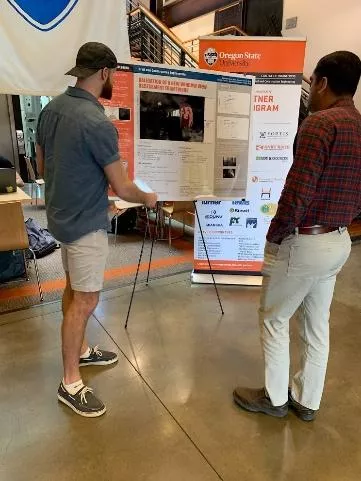
|
Image
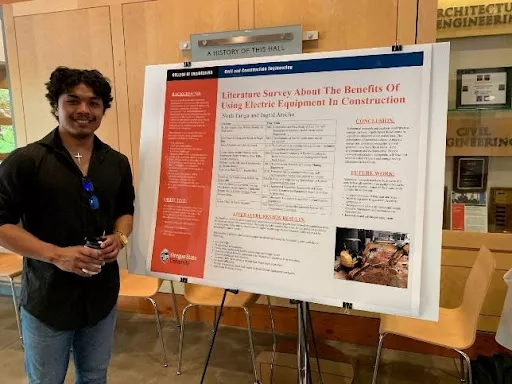
|
Image
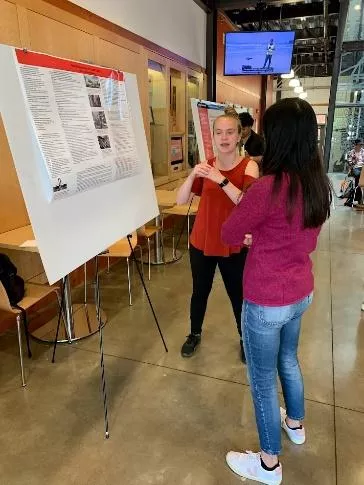
|
Kiewit Materials Performance Lab was designed to carry out sensitive bench-scale experiments to characterize various types of materials and investigate their deterioration mechanisms. Materials of interest involve cement/concrete, metals, alloys, polymers, coatings, asphalt and wood. The laboratory is equipped with grounded bench-top space, two high-performance fume hoods, an environmental test chamber, and electrochemical testing equipment (including potentiostats/galvanostats and FRAs for AC Impedance analysis). Among many other capabilities, the laboratory is fully equipped to conduct sensitive electrochemical investigations to study corrosion phenomena in metals/alloys and performance and durability of coatings and composite materials.
The Geospatial Center for the Arctic and Pacific (GCAP) leads cutting-edge research in geodesy and geospatial technologies in a region that is tectonically active yet underserved by existing geodetic infrastructure: the Pacific Northwest (PNW) and Alaska, including the U.S. Arctic. Through a NOAA National Geodetic Survey (NGS) Geospatial Modeling Grant, the center is conducting research to aid NGS in modernizing the National Spatial Reference System (NSRS), the official, national system for latitude, longitude, height, and gravity. Current projects include investigation of precise point positioning (PPP) and real-time networks (RTNs) within the NSRS, implementation of NGS’s new reference frames and geopotential datum for geospatial applications such as topographic mapping, light detection and ranging, and sonar surveys, and development of a National Real Time Network (RTN) alignment service. In other funded research, GCAP is working to develop new technologies and techniques for mapping shoreline and nearshore bathymetry and improving resilience to coastal and seismic hazards.
Christopher Parrish, Professor in the School of Civil and Construction Engineering, serves as the Director of the GCAP.

The Center for Freight Transportation for Efficient & Resilient Supply Chain (FERSC), delivers research activities organized into three thrusts. RT1 focuses on developing system-level methodologies to optimize freight performance as part of the broader supply chain in the short, medium, and long term. RT2 studies stakeholder behavior, particularly shippers and carriers, to understand and guide their interactions within the freight system. RT3 explores how technological innovations can enhance freight and supply chains, especially for under- represented populations and underserved regions.
The FERSC consortium members are strategically located across major freight hubs and routes, positioning them to conduct impactful freight and logistics research with global and national significance. With institutions like Texas A&M University, Oregon State University, California State University at Long Beach, University of Illinois at Chicago, University of Tennessee, and North Carolina A&T State University, they cover key regions such as the Gulf Coast, Pacific Northwest, Midwest, and Southeast, contributing to freight operations, workforce development, and addressing logistics challenges across the U.S.
Salvador Hernandez, Associate Professor in the Schol of Civil and Construction Engineering, serves as the Associate Director of Engagement for FERSC.

The Coastal Research and Education Actions for Transportation Equity (CREATE) conducts research in four thrusts, which were formed to address the significant challenges of coastal infrastructure durability and to reduce inequities in the transportation system, including transportation careers. At the core of CREATE is our Diversity, Equity, Inclusion, and Accessibility (DEI&A) vision that is embedded throughout all Center activities. Under this DEI&A umbrella, we will conduct research in four thrusts: 1) Transformational coastal transportation infrastructure design and construction, 2) Coastal transportation infrastructure evaluation, prediction, and degradation prevention, 3) Equitable response to unprecedented coastal hazards, and 4) Pathways to blue economy transportation careers. The center includes members from Texas State University, University of Miami, Texas A&M University, Oregon State University, and University of Puerto Rico at Mayaguez.
Christopher Higgins, Professor in the Schol of Civil and Construction Engineering, serves as the Associate Director at Oregon State University for CREATE.

The Center for Durable and Resilient Transportation Infrastructure (DuRe-Transpo) will address critical areas of national importance in the strategic topics of Durability, Construction, and Finance, focusing on the following Research Themes: (1) inspection, maintenance and preservation, (2) sustainable longevity, (3) health monitoring, (4) sustainable materials and structures for climate change mitigation, (5) advanced materials and technologies for construction retrofit, (6) construction methods and management, and, (7) innovative revenue and finance. The center includes consortium members from The University of Texas at Arlington (UTA, Lead), Howard University (HU), Missouri University of Science and Technology (S&T), Oregon State University (OSU), Purdue University (PU), and the University of Puerto Rico – Mayagüez (UPRM).
Jason Weiss, Professor in the Schol of Civil and Construction Engineering, serves as the Associate Director for Technology Transfer for DuRe-Transp.

NSF Industry-University Cooperative Research Centers Program (IUCRC) supported Center forConcrete Advancement Network (CAN) aims to develop new technologies and methods that willresult in concrete that is far more efficient, more rapidly deployable, and less dependent uponnatural resources. The objective is to use modern-day technology, such as multi-scalemodeling, digital manufacturing, machine learning, and artificial intelligence, to fast-track theimplementation of cutting-edge concepts into this key industrial sector, which often relies on20th-century technology. Breakthroughs in concrete innovation can be achieved using model-based prediction and verification in combination with traditional experimental methods, therebyadvancing the pace of technology transfer from concept to implementation. The networkincludes the University of Wisconsin, Milwaukee, Oregon State University, Concrete SealantsINC, USG, GRH, Elastizell, JENSEN Precast, LOCKE, Sika, and Tindall.
Jason Weiss, Professor in the School of Civil and Construction Engineering, serves as the Site Director for the CAN IUCRC.
Participating OSU faculty include Dr. Jason Weiss, Dr. Burkan Isgor, Dr. Jason Ideker, Dr. Chris Higgins, and Dr. Erica Fisher.

The Construction Safety Research Partnership (CSRP) is a partnership between OSU and construction industry organizations to conduct academic research on safety topics of interest to the construction industry. The CSRP aims to: (1) help improve safety in the industry through innovative research, (2) create an opportunity for industry and OSU collaboration to explore and solve important issues related to construction worker safety, (3) support OSU faculty, staff, and students, and (4) prepare students for leading roles in the industry related to safety.
Current CSRP member Organizations include SAIF, KNIFE RIVER, CRH Americas, and MDU Resources Group.
John Gambatese, Professor in the School of Civil and Construction Engineering, serves as the Founding Director of the CSRP.

Outreach
In addition to conducting funded and unfunded research, the center provides a variety of opportunities for K-12 outreach in STEM and professional development for practitioners throughout the Pacific Northwest.
The National Summer Transportation Institute (NSTI) Program is an initiative developed by the Federal Highway Administration (FHWA) to introduce high school students to transportation-related careers via elaborately designed, hands-on learning experiences. The Kiewit Center leads an NSTI offering in collaboration with the Oregon Department of Transportation (ODOT) and the STEM Academy at OSU. Since 2020, 50 rising 9th through 12th graders have been able to attend a week-long summer camp, through which they have visited transportation infrastructure and active projects across the state, toured research laboratories on campus, and participated in a variety of hands-on learning activities facilitated by skilled program staff. Funding for the program is supported by a grant from the FHWA.
|
Image
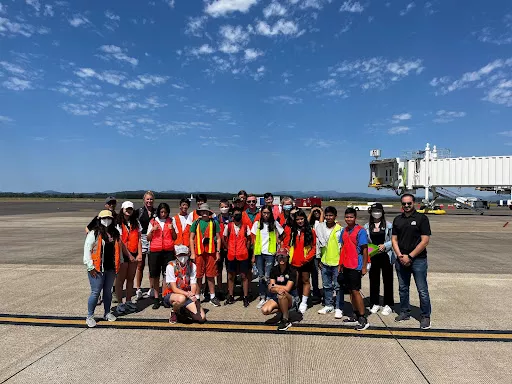
|
Image
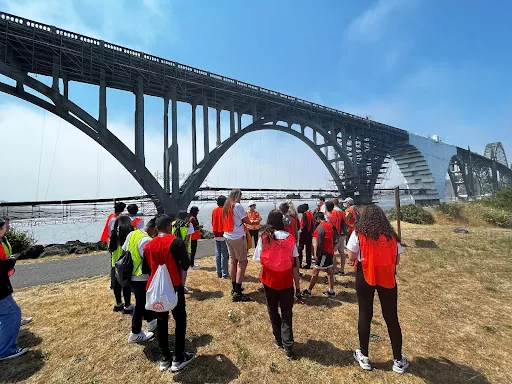
|
Image
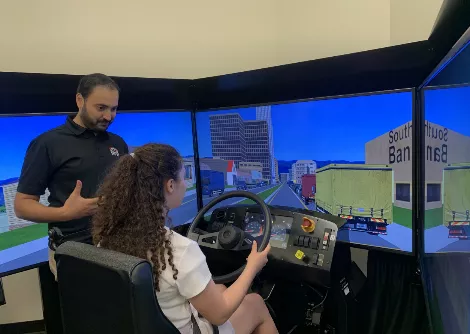
|
The Kiewit Center for Infrastructure and Transportation Research has been conducting a transportation safety continuing education program in partnership with ODOT since 1979. The in-person workshops, online webinars, and technical assistance activities are centered on transportation safety; topics range from transportation engineering fundamentals to access management. The schedule for currently planned workshops can be found here.
|
Image

|
The Northwest Transportation Conference (NWTC) is a biennial meeting held at OSU in Corvallis, Oregon since 1949. It has brought together multiple generations of transportation professionals (engineers, designers, builders, operators, planners, and others) with a common passion and purpose for improving the safety and efficiency of surface transportation in Oregon and beyond.
The conference represents sustained partnership between ODOT, OSU, Benton County, the Federal Highway Administration (FHWA), as well as other universities and transportation organizations in Oregon.
In recent years, the conference has drawn more than 300 participants during each three-day meeting.
|
Image

|